Shahid Akhter, editor, ETHealthworld, spoke to Deepa Param Singhal, Vice President – Applications, Oracle India, to know more about the latest advancements in Artificial Intelligence impacting healthcare and how Oracle is contributing by way of connected data approach.
AI impacting patient care
Recent technological innovations have extended their reach into the healthcare sector, notably through the rapid adoption of Artificial Intelligence (AI) in India’s healthcare industry. AI is revolutionising diagnostics, precision medicine, and patient care, aided by virtual assistants and chatbots. AI-driven remote patient monitoring systems enhance personalised care for those with chronic conditions. Today, HR function within healthcare organisations has an opportunity to get ahead of the curve and be the agent of change where they can focus on much better tasks. Automating routine tasks—payroll and benefits queries, onboarding, compliance, application filtering and performance monitoring can significantly increase productivity and bring change.
AI’s role in formulating a successful talent strategy in today’s competitive healthcare market is made more accessible as it provides HR professionals with valuable insights for usual challenges like restructuring following a health system merger, filling openings for skilled clinicians, or scaling to meet the needs of an ageing patient population. As per the World Economic Forum AI’s expenditure in India increased by over 109% in 2018, totalling $665 million and is expected to reach $11.78 billion by 2025, adding $1 trillion to India’s economy by 2035.
Cloud-based solutions in healthcare supply chain
Applying financial data to the HR data ensures that managers and executives support and pursue the overall business strategy and objectives. Decision-makers must get a single view of financial data across the health delivery systems to effectively use planning simultaneously, reduce the cost of care and build a more responsive supply chain.
Healthcare providers must reduce the time spent while tracking down supplies. For example, managing inventory flow—from order to delivery to replenishment. Additionally, they reduce the time clinical staff spend tracking the collections and procuring the new ones. Unpredictable demand and high administrative costs have put a massive strain on the healthcare industry, and cloud-based solutions effectively streamline the procurement of capital assets and medical equipment. Building a resilient supply chain function makes improving patient care more accessible for healthcare organisations.
Tech organisations addressing the issue of unpredictability in patient demand
Healthcare institutions grapple with persistent staffing and workforce flexibility challenges, significantly impacting patient care. With unpredictable demand, rising administrative costs, shifting cost structures, widening skills gaps, and a host of new challenges, healthcare organisations often need help to meet intricate staffing needs while simultaneously reducing expenses and supporting their dedicated staff to ensure the delivery of high-quality patient care. Technology providers are working towards addressing the skill gap and the unvoiced of patients to assist healthcare organisations in addressing evolving labour markets and workforce demands.
Recently, we announced enhanced capabilities around workforce management within its Oracle Fusion Cloud HCM. These new features, Oracle Workforce Scheduling and Oracle Workforce Labor Optimization are designed to facilitate seamless connectivity between business and electronic health record (EHR) data on a unified cloud platform. Given the skyrocketing administrative expenses, shifting cost
structures, growing skills gaps, and various new obstacles over recent years, healthcare organisations often need help addressing complex staffing needs and cutting costs while keeping heir hard-working teams supported and focused on delivering high-quality patient care. The newly launched offerings are personalised specifically for healthcare organisations.
Oracle’s connected data approach impacting healthcare
Healthcare providers urgently need enhanced tools to manage their workforce effectively, addressing the persistent staffing challenges that adversely impact patient care. The unpredictability of healthcare service demand and the widespread issue of understaffing among providers can lead to substandard care, ultimately affecting patient outcomes. Oracle has been servicing Indian organisations in various sectors for three decades and helping them achieve remarkable results. At Oracle, we have been emphasising offering the most secure and reliable healthcare solutions, which connect clinical, operational, HR and financial data to improve care and advance decision-making around health and well-being. As I mentioned, enterprises have already begun to turn towards consolidation and integration of their processes, and hence breaking down silos remains an essential factor for businesses – both globally as well in India. This connected enterprise strategy is working well for our customers.
Our connected enterprise strategy has been derived from the importance of data collection and how we analyse it to make it more decision-centric. Connected data helps businesses to improve operations, sharpen decision-making, analyse trends and deliver data-driven experiences for employees and customers. Many Oracle customers are actively working to break down the planning silos in organisations. By connecting financial, operational, and line of business planning on a single cloud, they’re improving planning accuracy, boosting collaboration and information sharing across departments, and increasing the speed with which they can make decisions. Recently, at our flagship event, a leading not-for-profit health system – Providence has announced that they have improved its ability to adapt, scale, and manage its workforce of over 117,000 caregivers—in addition to over 1,000 caregivers at its global healthcare engineering, operations, and innovation centre in India. Providence has consolidated finance, HR, and supply chains in the cloud using the Oracle Fusion Cloud Applications Suite.
We offer a comprehensive collection of data integration tools and application integration services that can help automate end-to-end processes and centralise data management with Oracle Cloud Infrastructure integration. Our domination as a top cloud solution provider and the fastest-growing cloud company is helping customers across the healthcare sector achieve benefits they never imagined. In India, healthcare customers are using our application solutions to embrace innovations such as Fortis Healthcare, Shri Gangaram Hospital, Aster DM Healthcare, Indira IVF, Marengo Asia Hospital, GSK Haleon, and Starhealth.


